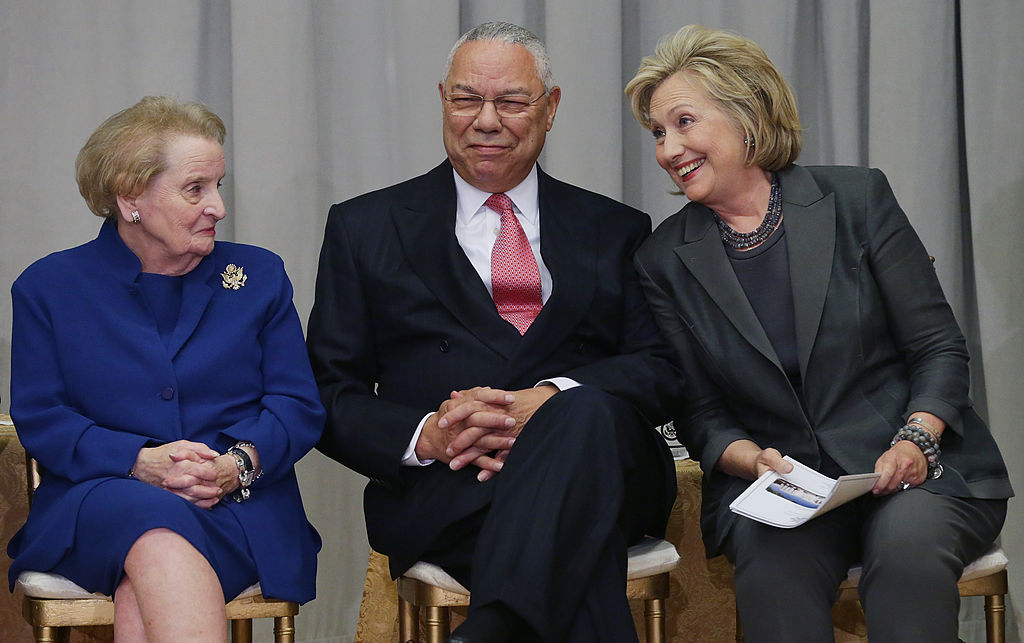New Hillary Clinton emails show Colin Powell did advise her on avoiding public scrutiny


A free daily email with the biggest news stories of the day – and the best features from TheWeek.com
You are now subscribed
Your newsletter sign-up was successful
On Jan. 23, 2009, two days after Hillary Clinton was sworn in as secretary of state, one of her predecessors, Colin Powell, emailed with some advice on what to do about her BlackBerry. Powell's advice was summarized in an FBI report on its July interview with Clinton about her use of a private email server, and Democrats on the House Government Reform and Oversight Committee released the entire exchange Wednesday night.
"I didn't have a BlackBerry," Powell wrote. "What I did do was have a personal computer that was hooked up to a private phone line (sounds ancient.) So I could communicate with a wide range of friends directly without it going through the State Department servers. I even used it to do business with some foreign leaders and some of the senior folks in the Department on their personal email accounts." Powell said he used an "ancient version of a PDA," or early smartphone, despite "all sorts of nonsense" from the NSA/CIA about "about how they gave out signals and could be read by spies, etc." He continued:
However, there is a real danger. If it is public that you have a BlackBerry and it it [sic] government and you are using it, government or not, to do business, it may become an official record and subject to the law.... Be very careful. I got around it all by not saying much and not using systems that captured the data. [Powell to Hillary Clinton]
Clinton told the FBI she didn't take Powell's advice, and Powell told People in August that "the truth is, she was using [the private email server] for a year before I sent her a memo telling her what I did," complaining that Clinton's people "have been trying to pin it on me." Rep. Elijah Cummings (Md.), the ranking Democrat on the committee, said Powell provided Clinton "a detailed blueprint on how to skirt security rules and bypass requirements to preserve federal records," and accused Republicans of a double standard: "If Republicans were truly concerned with transparency, strengthening FOIA, and preserving federal records, they would be attempting to recover Secretary Powell's emails from AOL, but they have taken no steps to do so despite the fact that this period — including the run-up to the Iraq War — was critical to our nation's history."
The Week
Escape your echo chamber. Get the facts behind the news, plus analysis from multiple perspectives.

Sign up for The Week's Free Newsletters
From our morning news briefing to a weekly Good News Newsletter, get the best of The Week delivered directly to your inbox.
From our morning news briefing to a weekly Good News Newsletter, get the best of The Week delivered directly to your inbox.
Powell declined to comment to The Wall Street Journal or CNN. You can read the email exchange at the oversight committee's Democratic site.
A free daily email with the biggest news stories of the day – and the best features from TheWeek.com
Peter has worked as a news and culture writer and editor at The Week since the site's launch in 2008. He covers politics, world affairs, religion and cultural currents. His journalism career began as a copy editor at a financial newswire and has included editorial positions at The New York Times Magazine, Facts on File, and Oregon State University.
-
 The ‘ravenous’ demand for Cornish minerals
The ‘ravenous’ demand for Cornish mineralsUnder the Radar Growing need for critical minerals to power tech has intensified ‘appetite’ for lithium, which could be a ‘huge boon’ for local economy
-
 Why are election experts taking Trump’s midterm threats seriously?
Why are election experts taking Trump’s midterm threats seriously?IN THE SPOTLIGHT As the president muses about polling place deployments and a centralized electoral system aimed at one-party control, lawmakers are taking this administration at its word
-
 ‘Restaurateurs have become millionaires’
‘Restaurateurs have become millionaires’Instant Opinion Opinion, comment and editorials of the day
-
 NIH director Bhattacharya tapped as acting CDC head
NIH director Bhattacharya tapped as acting CDC headSpeed Read Jay Bhattacharya, a critic of the CDC’s Covid-19 response, will now lead the Centers for Disease Control and Prevention
-
 Witkoff and Kushner tackle Ukraine, Iran in Geneva
Witkoff and Kushner tackle Ukraine, Iran in GenevaSpeed Read Steve Witkoff and Jared Kushner held negotiations aimed at securing a nuclear deal with Iran and an end to Russia’s war in Ukraine
-
 Pentagon spokesperson forced out as DHS’s resigns
Pentagon spokesperson forced out as DHS’s resignsSpeed Read Senior military adviser Col. David Butler was fired by Pete Hegseth and Homeland Security spokesperson Tricia McLaughlin is resigning
-
 Judge orders Washington slavery exhibit restored
Judge orders Washington slavery exhibit restoredSpeed Read The Trump administration took down displays about slavery at the President’s House Site in Philadelphia
-
 Hyatt chair joins growing list of Epstein files losers
Hyatt chair joins growing list of Epstein files losersSpeed Read Thomas Pritzker stepped down as executive chair of the Hyatt Hotels Corporation over his ties with Jeffrey Epstein and Ghislaine Maxwell
-
 Judge blocks Hegseth from punishing Kelly over video
Judge blocks Hegseth from punishing Kelly over videoSpeed Read Defense Secretary Pete Hegseth pushed for the senator to be demoted over a video in which he reminds military officials they should refuse illegal orders
-
 Trump’s EPA kills legal basis for federal climate policy
Trump’s EPA kills legal basis for federal climate policySpeed Read The government’s authority to regulate several planet-warming pollutants has been repealed
-
 House votes to end Trump’s Canada tariffs
House votes to end Trump’s Canada tariffsSpeed Read Six Republicans joined with Democrats to repeal the president’s tariffs
